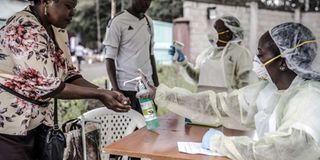Only way to fight Covid-19 misinformation is with facts

People sanitise their hands and are screened at Mbagathi hospital. Now, more than ever before, social media platforms are under pressure to curb the spread of Covid-19 misinformation by rapidly identifying, restricting or removing unreliable or misleading content. PHOTO | FILE | NATION MEDIA GROUP
Throughout history, nothing has killed more human beings than infectious diseases.
The self-replicating nature of disease-causing organisms, with human interaction and mobility propagating the spread of contagious organisms, makes them effective and indiscriminate mass killers. Against this backdrop, the pronouncement by the World Health Organization (WHO) of Covid-19 infection as a pandemic in March had an apocalyptic undertone reminiscent of the devastating Spanish flu of 1918. Its novelty, obscure origin, and the absence of effective therapeutic measures against the Sars-Cov-2 virus that causes Covid-19, its severe and often lethal consequences, the societal and economic disruption it has caused, and the relative dearth of information about it provoke intense emotional and psychological reactions to all. It also serves as a fertile ground for misinformation to flourish.
Due to internet connectivity and mobile devices, information travels fast and access is at a minimal or no cost. However, the platforms lack mechanisms to vet information accuracy. The result is a petri dish for misinformation cross-propagation. While it is difficult to establish the motive for this misinformation from content alone, there are certain common themes to this misinformation campaign.
The absence of definitive information on the origin of the new coronavirus has created an unusual appetite for rumours and conspiratorial thinking. Conspiracy theories heavily driven by geopolitics abound. The term disinformation is more appropriate in instances where the intent is either to deceive or obfuscate the recipient of the information to suit various interests. Well-intentioned people often circulate dubious content thinking it to be true.
Misinformation disempowers the public by the erosion of truth. Dwindling public trust of authority poses a serious risk to public health. This prompted the WHO to coin the word “infodemic” in reference to this growing ecosystem of misinformation and public distrust. Where does society draw the line between protecting the freedom of expression and countering the growing scourge of misinformation amid the Covid-19 pandemic? What can be done to ensure that truthful, helpful and potentially lifesaving information gains wider prominence?
The main strategy should be to improve the supply of truthful information to ensure the demand for information is met. Getting the facts out and debunking any myths will reduce the likelihood individuals seeking Covid-19-related information and guidance will turn to the cacophony arising from armchair epidemiologists who often gain attention through sensational claims, at times crowding out legitimate experts whose answers are rarely as tidy or emotionally reassuring.
Now, more than ever before, social media platforms are under pressure to curb the spread of misinformation by rapidly identifying, restricting or removing unreliable or misleading content. Granted, there are limitations to automated moderation tools, but a good starting point would be to trace the source and block content that goes against authoritative public health information. Ideally, strict penalties should be imposed on generators of misinformation, especially when an underlying nefarious motive can be established.
The public should also be educated to view circulating Covid-19-related content with a dose of skepticism, critically pausing to check the source, author and then assessing the accuracy of the information prior to forwarding it to others. They should admonish their contacts spreading misinformation to cease from doing so, meanwhile providing them with alternative information on the subject from authoritative sources.
Only by exercising such vigilance against viral misinformation can users of media content become the immune system for the web; ‘antibodies’ as it were against falsehoods. ’Flattening the curve of misinformation’ is just as crucial as ‘flattening the contagion curve’ of Covid-19 infections.
Dr Olweny is a director at Evans Sunrise Medical Centre, Nakuru, and secretary-general of Kenya Association of Private Hospitals

